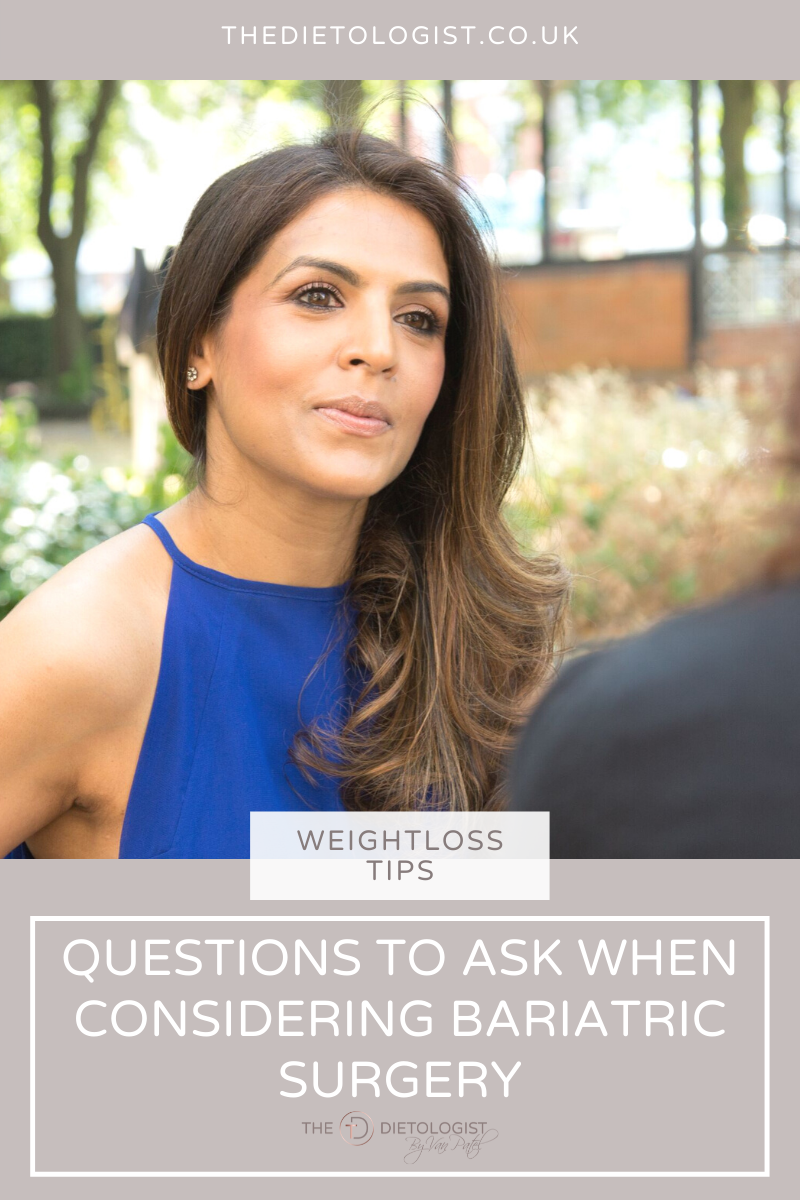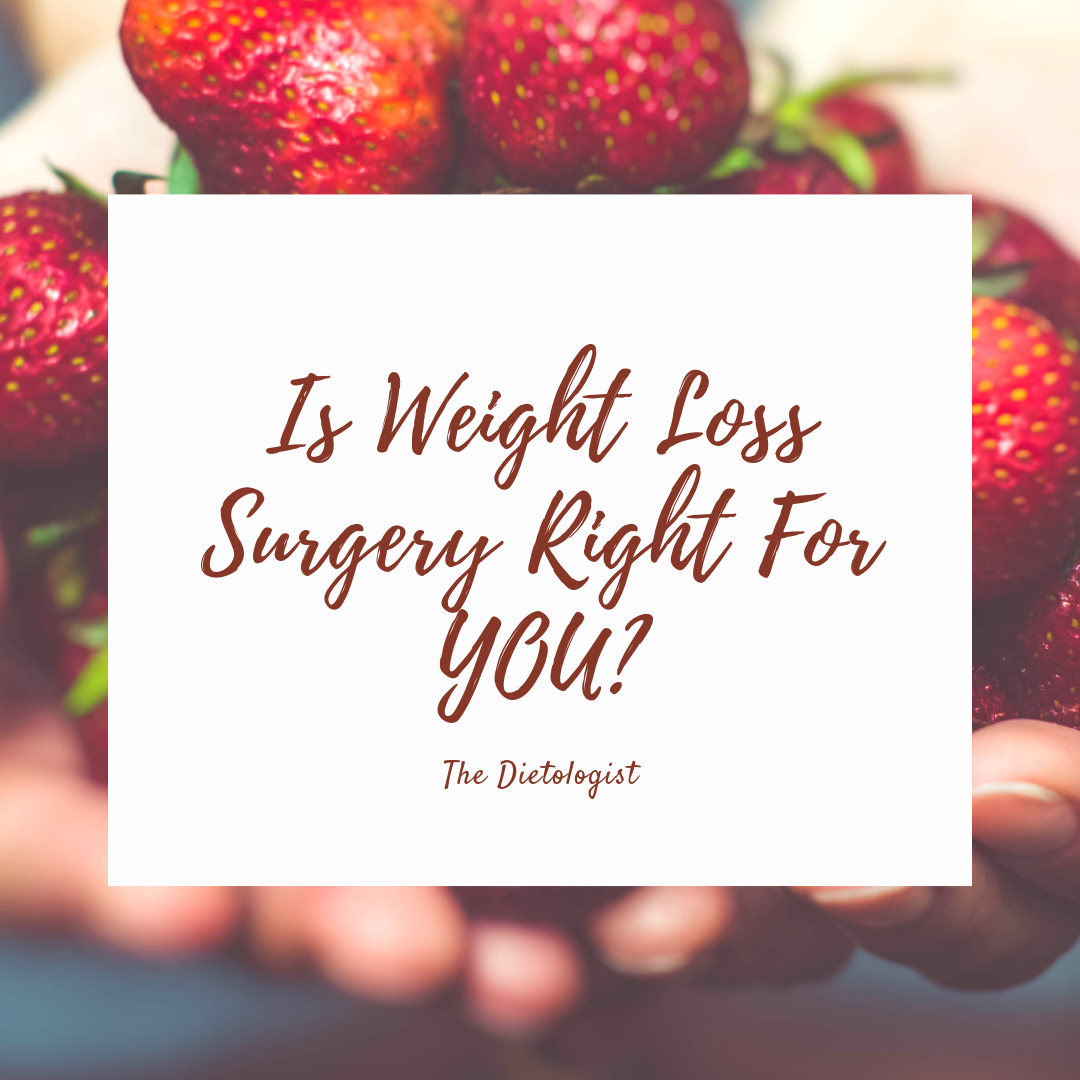QUESTIONS TO ASK WHEN CONSIDERING BARIATRIC SURGERY
Bariatric / weight loss surgery is a life changing decision that will alter your life forever and should only be considered after trying to lose weight through a healthy diet and exercise has failed.

If you are considering bariatric surgery, it is important that you gain as much information as possible before making the decision and have clear ideas about what to expect.
There are lots of questions that you should ask when consulting with your bariatric surgeon oe dietitian:
Am I a suitable candidate for bariatric surgery?
What is the process? What tests will I have to undergo before having the procedure?
How long is the recovery period?
How quickly will I lose weight?
Will I get scarring and loose skin?
What are the health risks?
Is it reversible?
However, there are also questions you need to ask yourself and seriously consider before opting for bariatric surgery.
Why do I wish to get bariatric surgery? Have I struggled to lose weight through lifestyle and dietary changes?
Weight gain and obesity isn’t as simple as eating too much, eating unhealthy foods and living a sedentary lifestyle - there are many factors that make it extremely difficult to lose weight including the menopause and changing hormone levels in the body, and health is not always equal to size and weight. Bariatric surgery is suitable for those who have repeatedly tried and failed to lose weight through lifestyle and dietary changes. It isn’t a quick fix and it isn’t an easy option.
What type of surgery is best for me? Have I done my research?
The most common types of bariatric surgery are:
Gastric band,
Gastric Bypass,
Mini Gastric Bypass,
Sleeve Gastrectomy,
Gastric Balloon.
All these operations can lead to significant weight loss within a few years and may also help improve many obesity related conditions, such as diabetes or high blood pressure. Each has advantages and disadvantages and it is important to thoroughly discuss each option with your bariatric surgeon or dietitian to decide on which one is right for you.
What is my current relationship with food? Will I be on a diet for the rest of my life? Am I aware of how my eating habits and relationship with food will need to change after having bariatric surgery?
Good nutrition is not as simple as saying “I can’t eat “bad” foods like chocolate and cakes.” I have said it before and will say it again - bariatric surgery is simply a tool to aid you in your weight loss journey, and improving and changing your relationship with food is incredibly important. I don’t believe in “diets,” as labelling foods as “good” and “bad” and removing certain foods completely leads to cravings and a binge / restrict mindset. It’s all about finding the right balance for you to help you lose weight and keep it off while maintaining a healthy relationship with food. At The Dietologist I help you get to grips with emotional eating and move away from FAD diets, counting calories and weighing food. The goal is to discover food FREEDOM and take the worry out of enjoying the foods you love.
What can I expect after having bariatric surgery? Am I prepared to deal with side-effects?
It is important that you gain as much knowledge as possible about what to potentially expect after undergoing bariatric surgery. While weight loss surgery is unique to each individual, there are many things that people can experience post-surgery that they didn’t necessarily expect, including temporary hair loss, changes in taste (even water), feeling cold, difficulty in opening their bowels immediately after surgery, acid reflux and even a small weight gain after a goal weight is reached. Are you prepared to deal with any side-effects that you may experience post-surgery?
To find out more about what my clients wished they had known before having bariatric surgery, visit my blog post here:
ADD IN LINK TO WHAT MY CLIENTS WISH THEY HAD KNOWN POST HERE or visit my
FAQ’s.
Should I tell people that I’m having bariatric surgery?
Unfortunately, many who have had bariatric surgery choose not to share their decision with family, friends and colleagues as there is still a heavy social stigma and lots of negative misconceptions surrounding the procedure, with assumptions being made that it is a “quick fix” or done for vanity and cosmetic reasons. While you aren’t under any obligations to discuss your private medical procedures with anyone else, having support from others, including professional support, will make the process easier. Remember that opting for bariatric surgery is part of the process of improving your physical and emotional wellbeing and creating a better quality of life for yourself, which is something to be proud of!
To read more on whether you should keep your bariatric surgery a secret,
visit my blog post here:
Can I still get pregnant after bariatric surgery? Am I prepared to wait?
You have to wait 18 months post-surgery before you get pregnant. It used to be 2 years, but this advice was changed earlier this year. Be aware that weight loss surgery will have an impact on your hormones and you may find with the weight loss your periods become irregular. As you lose weight you’ll find your fertility is likely to improve so contraception is essential.
Will my current lifestyle support my weight loss journey? What changes will I need to make?
It’s important to consider any lifestyle changes that you may need to make before, during and after bariatric surgery. You also need to consider the support that you are going to need post-surgery. Will I be able to take time off work? Do I have someone who can help me at home immediately post-surgery? Do I have childcare available immediately after surgery?
Finally, you need to ensure that you are emotionally ready to fully commit to your weight loss journey and understand that this is a lifelong change in lifestyle and your emotional relationship with food.
Want to know more about bariatric surgery and how I can help?
At The Dietologist I can assess and take the time to get a better understanding of your health, relationship with food, weight struggles, lifestyle demands and medical conditions, and work with you to find ways your diet can be improved to help you achieve realistic results before, during and after bariatric surgery.
To book a Discovery Call.



